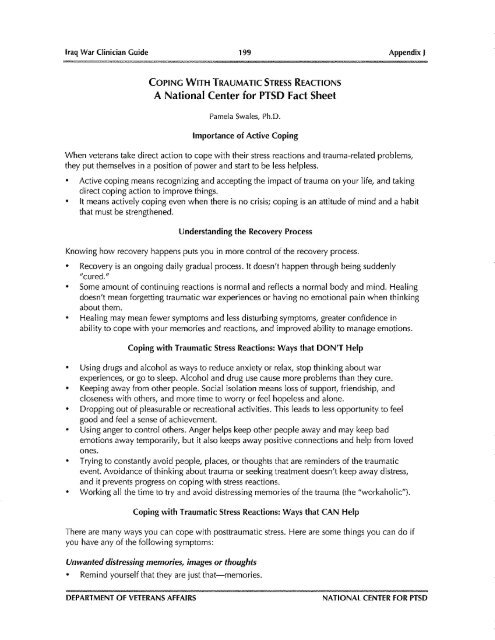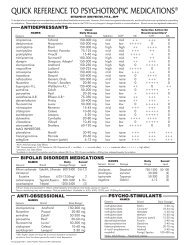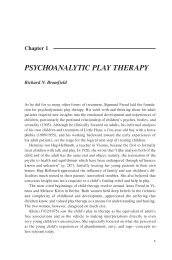IRAQ WAR CLINICIAN GUIDE
Iraq War Clinician's Guide - Network Of Care
Iraq War Clinician's Guide - Network Of Care
Create successful ePaper yourself
Turn your PDF publications into a flip-book with our unique Google optimized e-Paper software.
Iraq War Clinician Guide 199 Appendix 1<br />
COPINGWITHTRAUMATICSTRESSREACTIONS<br />
A National Center for PTSD Fact Sheet<br />
Pamela Swales, Ph.D.<br />
Importance of Active Coping<br />
When veterans take direct action to cope with their stress reactions and trauma-related problems,<br />
they put themselves in a position of power and start to be less helpless.<br />
Active coping means recognizingand acceptingthe impact of trauma on your life, and taking<br />
direct coping action to improve things.<br />
It means actively coping even when there is no crisis; coping is an attitude of mind and a habit<br />
that must be strengthened.<br />
Understandingthe Recovery Process<br />
Knowing how recovery happens puts you in more control of the recovery process.<br />
Recovery is an ongoing daily gradual process. It doesn't happen through being suddenly<br />
"cured."<br />
Some amount of continuing reactions is normal and reflects a normal body and mind. Healing<br />
doesn't mean forgetting traumatic war experiences or having no emotional pain when thinking<br />
about them.<br />
Healing may mean fewer symptoms and less disturbing symptoms, greater confidence in<br />
ability to cope with your memories and reactions, and improved ability to manage emotions.<br />
Coping with Traumatic Stress Reactions: Ways that DON'T Help<br />
Using drugs and alcohol as ways to reduce anxiety or relax, stop thinking about war<br />
experiences, or go to sleep. Alcohol and drug use cause more problems than they cure.<br />
Keeping away from other people. Social isolation means loss of support, friendship, and<br />
closeness with others, and more time to worry or feel hopeless and alone.<br />
Dropping out of pleasurable or recreational activities. This leads to less opportunity to feel<br />
good and feel a sense of achievement.<br />
Usinganger to control others. Anger helps keep other people away and may keep bad<br />
emotions away temporarily, but it also keeps away positive connections and help from loved<br />
ones.<br />
Trying to constantly avoid people, places, or thoughts that are reminders of the traumatic<br />
event. Avoidance of thinking about trauma or seeking treatment doesn't keep away distress,<br />
and it prevents progress on coping with stress reactions.<br />
Working all the time to try and avoid distressing memories of the trauma (the "workaholic").<br />
Coping with Traumatic Stress Reactions: Ways that CAN Help<br />
There are many ways you can cope with posttraumatic stress. Here are some things you can do if<br />
you have any of the following symptoms:<br />
Unwanteddistressingmemories, images or thoughts<br />
Remind yourself that they are just that-memories.<br />
DEPARTMENT OF VETERANS AFFAIRS<br />
NATIONAL CENTER FOR PTSD




